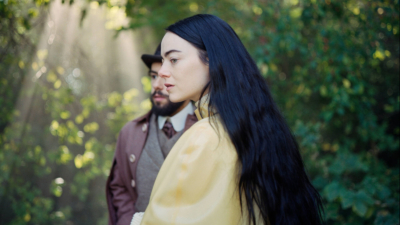
Art Donaldson is a successful tennis player at the top of his career. When pressure appears and affects his sports results, Tashi Duncan — Art’s wife, ambitious coach and former tennis player, who had to end her once brilliant career early due to an injury — decides to help him come back to form. She enlists Art in a challenger tournament to boost his confidence. It turns out, however, that Art’s former friend Patrick Zweig also participates in the game. When the two meet at the court, memories of their stormy past return, making the duel even more emotionally charged.
In theory, it’s a great idea for a story where sport is just a pretext to show a complex, multidimensional relationship between three people. In reality, though, the film is about people who are extremely toxic and unlikeable. Sure, it could work as a character study where the appetite for victory ruins one’s private life. Especially, with such classic themes as projecting unrealised ambition onto another person, undermining one another, using other person’s misfortune for one’s good, intrigues, plots, and the like. But, in “Challengers”, all of this is unbelievably shallow, and the characters seem emotionally stuck in one place throughout the film. Even the ending, which was supposed to serve as a big punchline for the annoying love triangle, comes down to the director screaming at your face and telling you things you had already noticed.
The uneven direction makes the film even worse. Tennis — a dull sport as far as I’m concerned (sorry to all the fans) — gains nothing in dynamics through Guadagnino’s lens. And that’s despite the filmmaking ideas being diverse and fascinating. Possibly, the Italian director couldn’t see the appeal of the sports either — this would explain the constant perspective shifts and a full array of cinematographic and editorial tricks. They’re just too much at some point, and the impression is strengthened by the intrusive score by Trent Reznor and Atticus Ross — definitely too loud and poorly matched to picture.

The direction also fails when it comes to maintaining tension and it’s evident towards the end of the film. One of the characters is about to do something that changes the whole dynamics of the tennis match. The audience is on the edge of their seats. But, after some time, instead of thinking “Will he or won’t he? What happens if he will?”, the viewers become impatient. And that’s because Guadagnino unnecessarily drags the scene. And so the audience loses its interest. Again, too much of everything.
Fortunately, acting-wise, the film is outstanding. Zendaya as the overambitious Tashi, whose life revolves around tennis, is fantastic. Both as her teenage version, when all she cares about is her career; and her adult version, when she tries to maintain his husband’s career at all costs. Zendaya uses tiny details to make her portrayal more nuanced: facial expressions, gestures, voice modulation… And although her Tashi is enigmatic, the actress can believably uncover her true emotions in key moments.
Josh O’Connor (whom I sometimes totally confuse with James Norton and Callum Turner 😅), uses his unusual physiognomy in the role of Patrick. Every so often, it’s enough for him to slightly narrow his eyes and smile in his signature, roguish way to convey the core traits of his character and… it works surprisingly well. Of course, he reaches for more acting tools, such as a distinct, arrogant way of articulating words. It all makes up an interesting and magnetising portrayal.
Although Mike Faist is probably the least known of the film’s stars, he has made the biggest impression on me. His Art is not as colourful as the two other characters. However, Faist manages to find intriguing elements of this normalcy and brings them out emotionally. In my opinion, his Art is the most complex and ambivalent character in the film, and Faist deserves a lot of credit for that. I will certainly watch the actor’s further career very closely.
So if you’re going in for the actors, you won’t be disappointed. But I can’t recommend the rest. Because if you want to watch a love triangle film, you’ll be better off choosing “Past Lives”. If you prefer a study of someone who projects their unfulfilled ambitions onto a person close to them, go for Polish “Coach’s Daughter”. And if you’d like to feel some real tennis emotions and see how one should film this sport, watch the brilliant “Borg vs McEnroe”.








